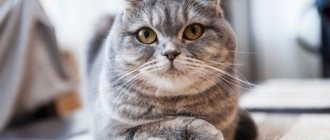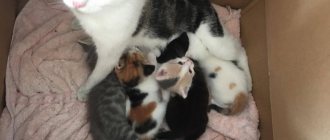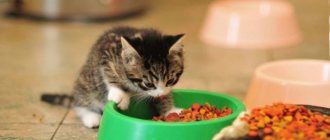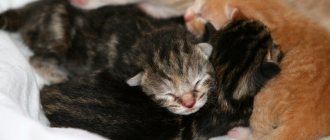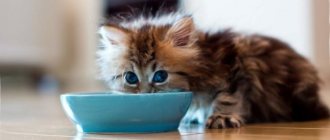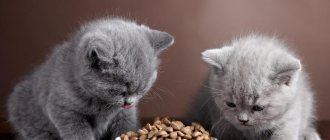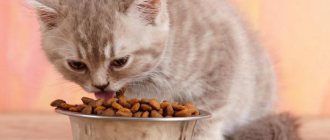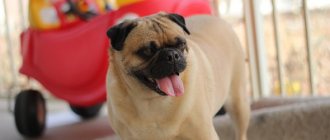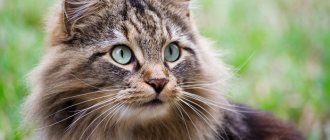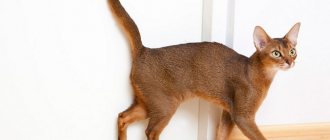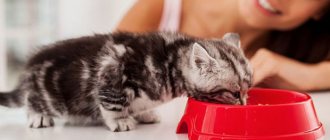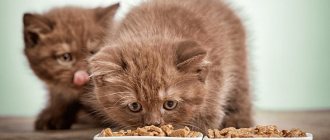Breed Features
British cats are a breed that developed naturally in nature. It has certain characteristics that have survived to the pets of our day. For example, they do not have hereditary diseases.
When buying British kittens, it is important to know the characteristics of the breed regarding digestion:
- Oral cavity. British people are rarely affected by dental caries, but tartar is a common occurrence. If untimely removal occurs, the gums begin to become inflamed, which leads to tooth loss. In this situation, it is no longer possible to talk about high-quality absorption of food. After changing the milk line, which ends by six months, the owner is advised to carefully monitor the health of the pet’s teeth and gums.
- Tendency to obesity. Feeding the British has a special role, since the breed is prone to weight gain. Exceeding caloric intake by 1% today will lead to a couple of extra pounds in a few days. This will affect not only body parameters, but also health. Obesity leads to liver disease, cardiovascular disease and diabetes.
- Constipation. British cats are prone to intestinal blockages. Normally, bowel movements should occur once a day. If this does not happen, then you should pay attention to the behavior and condition of the pet. If you notice lethargy, lack of appetite, or tension in the abdominal wall, it is recommended to immediately consult a veterinarian.
- Susceptibility to urolithiasis. Because of this factor, the British should not be fed a mixed diet. When feeding natural food, it is recommended to completely avoid ready-made dry kibble, even as a treat.
The peculiarities include some of the character traits of the British, which are reflected in their diet.
For example, they are self-sufficient, independent and arrogant. Therefore, the cat will never beg for food. If she wants to have a snack, she will quietly wait near the bowl.
The naturalness and naturalness of the breed determined the preservation of predatory instincts in modern cats. Therefore, their diet necessarily includes meat, some of which is served raw.
Ready-made feed
Many owners prefer to give their Britons dry food and wet canned food - it’s convenient and simple. But the products must be of high quality - not lower than premium.
It is better to avoid buying cheap food from the nearest supermarket. Economy class food contains practically no natural meat. But they contain ballast substances, dyes, flavors and other harmful components.
You should carefully study the composition of the feed. Meat should come first. Good products contain vitamins, minerals and amino acids that support the health and strengthen the immune system of the British cat. A minimum of carbohydrates is encouraged - they lead to weight gain.
Selection of industrial feed
Owners of British cats consider the following brands to be the best food:
- Earthborn Holistic;
- Go! Natural Holistic;
- Bosch Sanabelle Grande;
- Acana;
- Orijen;
- Eukanuba;
- Eagle Pac Cat Holistic;
- 1st Choice.
This is a super premium class and holistic food. They are quite expensive, but their composition fully satisfies the needs of the cat's body.
If your budget is limited, you can purchase premium food for the British:
- Purina Pro Plan;
- Brit Premium;
- RoyalCanin;
- Hill's.
The Royal Canin company produces a special food for British kittens that can be fed to babies aged 4 to 12 months - British Shorthair Kitten. It is highly digestible and contains prebiotics that support the functioning of the gastrointestinal tract.
Royal Canin produces British Shorthair Adult food for adult cats. It helps Britons maintain muscle mass. Omega-3 fatty acids strengthen joints and maintain their mobility.
For kittens, pregnant, lactating, spayed, neutered, elderly cats or pets with any diseases, buy food from specialized lines. All well-known manufacturers have such names.
Before choosing food for your British cat, it is better to consult a veterinarian. He will give individual nutritional recommendations.
Choosing a place and dishes
After purchasing a kitten, it is recommended to arrange a feeding area. This is an important moment for cats. The choice of place and utensils is carried out taking into account the characteristics of the animal. For example, the British eat small portions.
Recommendations for the place:
- Cats prefer to snack in a quiet environment, so it is better to arrange a place away from washing machines and TV.
- The feeding area is kept clean, so it is recommended to place easy-to-clean material under the bowls.
- There must be constant free access to food.
- Bowls should not be placed in the aisle, as cats do not like it when someone walks nearby while snacking. A convenient location will help to avoid constant tripping over dishes by the owner himself.
- If you set up a feeding area for a kitten on a small hill, then it will jump up to it. This will increase physical activity, which is beneficial for Britons due to their tendency to be obese.
- If there are several pets in the house, the feeding area is arranged separately for each animal.
Feeding utensils are a special thing. The container that comes to hand first is not suitable for this purpose. From the first months of life, British cats require 2 bowls: for drinking and for feeding.
Vaccinations
Do not forget that the British breed was bred almost artificially. Animals of this breed have weak immunity. Don't neglect vaccinations ! In fact, this is very important. Already in the period from two to three months, a kitten can be vaccinated. This will protect him from many diseases. Before visiting the veterinarian, give your pet an anthelmintic drug ten days in advance; if after ten days no helminths are found, then you can safely visit the veterinarian.
After the first vaccination, the second one is given, exactly twenty-one days later. The same vaccine is administered, and after fourteen days immunity is developed. Repeated vaccinations are recommended every year.
What to feed a British kitten
Cats have developed predator instincts. If dogs switched over time to human food, then food for cats should include meat products so that the animals can grow normally.
Breed characteristics have given the British a whimsical diet. They require a lot of food per day, but they eat in small portions.
Veterinarians recommend feeding Britons around the clock. At an early age, you don’t need to worry about possible weight problems, since all the nutrients will go towards growth and development. Moreover, the kitten will not eat more than necessary due to the small volume of the stomach.
Studying all types of diet will help you decide what to feed your British kitten. There are 3 varieties: natural, mixed feeding and ready-made food.
Natural diet
A natural diet is the best option for British cats. It consists of feeding your pet only natural products (meat, fish, cereals, vegetables).
You should not give your pet the same foods over and over again. For example, some owners feed only fish, which is wrong. A healthy diet should be balanced in all nutrients (proteins, fats, carbohydrates) and non-nutrients (water, vitamins, minerals).
If the choice falls on a natural diet, then it is necessary to take into account individual sensitivity to certain products. For example, not all Britons tolerate cow's milk well; it often causes digestive problems (diarrhea).
List of approved natural products for British cats:
- Meat – poultry (chicken, turkey), rabbit, beef. It is better to give it boiled, and raw beef with streaks, so that the kittens sharpen their teeth. They give 30 grams of beef every other day.
- Minced meat and offal. Shredded meat is given boiled, as it can be contaminated with helminth eggs. Liver (beef, chicken) – once every 7 days, as there is a possibility of digestive disorders when consuming it. Pork liver is prohibited.
- Fish is an undesirable food for the British. You can give low-fat fish once a week, only boiled.
- Chicken yolks. When boiled, they are added to porridge; when raw, they are given no more than 2 times a week.
- Dairy products (sour cream, kefir, cream, fermented baked milk, cottage cheese) low-fat or low-fat. Allowed to give 3 times a week. Milk is allowed only up to six months, unless there is lactose intolerance. Be sure to boil before serving.
- Cereals (rice, buckwheat). They make boiled porridge and serve it mixed with meat products, fish or chicken yolks.
- Vegetables are boiled, chopped, mixed with meat. It can also be given raw.
When accustoming to a natural diet, it is recommended to give your pet vitamin and mineral supplements, dry brewer's yeast, and vegetable oils. They will prevent intestinal disorders and add shine and thickness to the coat.
Advantages:
- Satisfying predatory instincts. Meat is an essential element of a natural diet.
- Saving money. Buying regular food is cheaper than buying high quality food.
- Confidence in the quality, freshness and completeness of the selected products.
- The ability to detect intolerance to any substances or products, for example, lactose.
Flaws:
- The need to constantly cook. If the owner is not going to spend a lot of time on his pet, then a natural diet is not the best option.
- Rapid deterioration. Natural products spoil quickly; storage in the refrigerator should not exceed 2-3 days.
- The need for diversity. You can't give the same foods over and over again.
A natural diet has its disadvantages, but for the British it is optimal. This breed is a real predator, so the presence of meat is mandatory.
Ready-made feed
Ready-made food must be given from the same brand and manufacturer. For kittens, products must be appropriately labeled. This food will be rich in all the beneficial elements for a growing organism.
Power type
Disputes about the choice of food type are still ongoing. There are two options:
- ready-made food;
- natural food.
Ready-made food is produced according to certain standards, implying that the food contains a complex of nutrients, vitamins and elements. In addition, the consistency is taken into account, which corresponds to the age and weight of the animal. The cat's body cannot produce a number of substances, these include taurine, arachidonic acid, vitamin A, so these compounds must be supplied with food.
Manufacturers add the required amount of components to ready-made food, which are calculated based on the age and other parameters of the pet. Some premium products are designed specifically for British shorthair cats, which allows for an individual approach to feeding the animal. For example, manufacturers take into account the size of the jaw and also add special components that improve heart function.
Leading experts do not deny the benefits of natural nutrition. If the owner has chosen to feed the kitten homemade food, you should contact a veterinarian, who will calculate the required amount of food and describe the composition of the dishes.
The menu should cover not only the cat’s energy costs, but also replenish the deficiency of vitamins, minerals and other substances. Selecting food for an animal on your own can result in poisoning, the development of chronic diseases, and even death, so do not neglect going to the doctor.
Thus, what to feed a British kitten must be decided by the owner himself. At the same time, it is important to take into account the type of food your pet received within the walls of the nursery, since a quick transition to another feeding will not lead to the desired result - the kitten’s digestive function may be impaired and an allergy may develop.
When choosing the type of food, it is also worth considering the age and weight of the kitten. Feeding a month-old and a six-month-old pet is very different due to the fact that the body develops and grows, as well as the gradual formation of internal organs.
Many experts are inclined to believe that cat nutrition should follow the one-third rule. The principle is that the diet includes equal parts of both natural products and canned food and dry food. A comprehensive menu saturates the animal’s body with useful substances as much as possible.
This is interesting: How to care for a 1 month old British kitten
Sample menu by age
The nutrition of kittens changes as they grow, so the owner needs to know an approximate menu by age. The list of products in it is conditional, it is allowed to diversify it, which will benefit the pet.
Up to a month
Up to a month, kittens are usually fed by the mother with her colostrum and milk. She calculates the frequency of feeding herself for her offspring. The secretion of the mammary glands is the most suitable food for newborn kittens. It contains everything you need to create strong immunity.
Sometimes the mother cannot or refuses to feed the cubs. Then the owner will have to fatten the pets. For this purpose, a cat's milk replacer is used. The number of feedings and method of breeding are indicated on the packaging. Usually replacements are given for up to 4 weeks.
1 month
When the kitten is 1 month old, it is advisable to continue feeding it with mother's milk. If this is not possible, then a high-quality substitute. Then there is a smooth transition to solid food.
Basic Rules:
- Start introducing dairy products into your diet, but raw cow's milk is not recommended. The best option is infant formula.
- Include meat in your diet with boiled finely chopped beef or, better yet, veal.
- Gradually include porridge made from buckwheat, semolina or oatmeal.
- At the end of the first month, introduce fermented milk products: cottage cheese, yogurt.
- Give boiled liver 1-2 times a week.
FEEDING BRITISH: BRITISH KITTENS, CATS, FROM BIRTH TO ONE YEAR
Feeding of the British: British kittens, cats, cats from birth to one year we will divide them in detail and describe them in the table.
Until the age of 3 months, a British kitten receives nutritious food in the nursery, and then the new parents monitor its nutritious nutrition.
| Feeding Brits by age | How many times to feed a Briton: British kitten, cat, cat | Diet of a British kitten, cat, cat: British food at a certain age | What do British kittens eat: balance of dry and wet food |
| British kitten 0-3 weeks | What to feed small British kittens? — We don’t feed, the mother cat takes on this important function. | ||
| British kittens, feeding at 3-4 weeks | We start feeding once a day; by the end of the 4th week, complementary feeding should be 3 times a day. The main food is still the milk of the mother cat. | British kitten diet:
| 100% wet food |
| Feeding British kittens at 1-1.5 months | Complementary feeding 3-6 times a day (depending on the frequency of feeding the mother cat). Kittens gradually refuse their mother's milk. | What to feed a one-month-old British kitten - Diet of a British kitten:
| 100% wet food |
| Feeding British kittens at 2 months | What to feed a British kitten - Complementary feeding 6-8 times a day in small portions | British kitten diet:
| 100% wet food, some of which is soaked dry food (so that kittens get used to the taste of such food) |
| Feeding British kittens at 3 months | Complementary feeding 6 times a day | British kitten food:
| 90% wet food, 10% dry food |
| Feeding British kittens at 4-6 months | Complementary feeding 5-6 times a day; by the end of the 6th month, feeding a British kitten is reduced to 4 times a day | British cat diet:
| 70-80% wet food, 20-30% dry food |
| Feeding British kittens at 6-10 months | British kittens are fed 3-4 times a day | Diet of British cats:
From 6 months we remove milk from the diet! | 60-70% wet food, 30-40% dry food |
| Feeding a British cat 10-12 months | The British cat is fed 2-3 times a day. Feeding British cats after 10 months can already be practically equated to adult nutrition. | Diet of British cats:
| 50-60% wet food 40-50% dry food |
| Adult British cat, feeding after a year | Feeding remains this way throughout the animal’s life. Feeding a British cat after a year - 2 times a day. | Diet of British cats:
| At least 30% wet food, the rest dry food |
The importance of water in the British diet
For British cats, and even more so kittens, water is an important substance necessary for the normal functioning, growth and development of the body. It is required in moderation. If wet food was chosen for feeding, then less water will be needed.
Main conditions:
- constant access to a bowl of water;
- keeping it clean;
- change the liquid every day or more often if pieces of food or other objects get into the container;
- placing a bowl of water separately from the container with food.
Ordinary tap water is suitable for drinking, as long as it has no foreign odor or taste . It happens that a cat refuses to drink tap water, then filtered or purchased drinking water is taken.
Necessary supplies for a new family member
To make your little one feel comfortable in your home, you need to carefully prepare. Buy for him:
- a house where he will sleep and relax if he wants to be alone;
- bowls for water and food;
- toys;
- pet carrier;
- buy food;
- tray and filler for it.
It is better to take plastic carriers. Despite the fact that the plastic one is very bulky during transportation, it holds its shape perfectly and if something happens, the animal will be comfortable there.
So that the British cat has his own corner for relaxation, buy him a sleeping place, or make it yourself. Take an unnecessary box from under furniture, equipment (in terms of volume it should allow the cat to lie stretched out). Make a hole for the entrance, cover the bottom of the box with an old jacket, a pillow, and place it in a cozy corner.
Buy a special post where you can sharpen the claws. If you have an old frame or piece of wood, make it available to the kitten.
What not to feed a British kitten
After studying the nutritional information, one question remains: what should you not feed your British kitten?
Prohibited products:
- sweet, smoked, fried dishes from the human table;
- river fish with a lot of bones;
- fatty meat, potatoes, legumes;
- milk after reaching six months;
- budget food made from second-class raw materials.
The British cat is a noble, wayward breed. For a healthy appearance, soft, thick coat, it is recommended to adhere to feeding rules. If there is no opportunity and desire, then the British are the wrong breed.
Prohibited Products
What should you not give to British kittens? In fact, the list of products here is the same as in the case of adult animals, which also have an impressive list of prohibited products:
- cheap food (dry, canned and preserved) - the cheaper the product, the lower-grade raw materials it uses;
- fresh raw meat;
- pork – it contains microorganisms that are dangerous to cats and is too fatty for animals;
- river fish (can be sea fish, where there are no small bones);
- milk upon reaching six months of age - it is not digested and causes stomach upset;
- onions are dangerous to the health of the animal;
- sweets, pickles, smoked foods.
If you follow the correct diet and exclude harmful foods, you can be sure that your pet will grow and develop correctly. The British have their own restrictions. For example, by-products that can affect the color of the coat are not recommended for lilac-colored kittens.
Owners of a blue coat, in addition, should not eat foods containing carrots and seaweed.
Veterinarian advice
The first and most important thing that veterinarians remind you of is that your pet’s diet should be stable, without surprises or sudden changes. It is recommended to immediately determine whether the pet will receive natural food or a ready-made balanced diet. If the animal eats food, fresh foods should be introduced into its diet occasionally, as complementary foods.
For an animal suffering from constipation or other stool disorders, eating disorders are most often characteristic. If the owner gives porridge and meat one day, and only dry food the next, this is guaranteed to lead to problems in the digestive system. It’s worth talking to the breeder about what diet the baby is used to. It is recommended to give seafood with caution - they can cause increased intestinal motility or lead to stool upset. If problems have already arisen and last more than a day, the animal loses appetite, becomes weaker, or discharge appears from the eyes, you should immediately consult a doctor.
For information on what to feed British breed kittens, watch the following video:
Source
